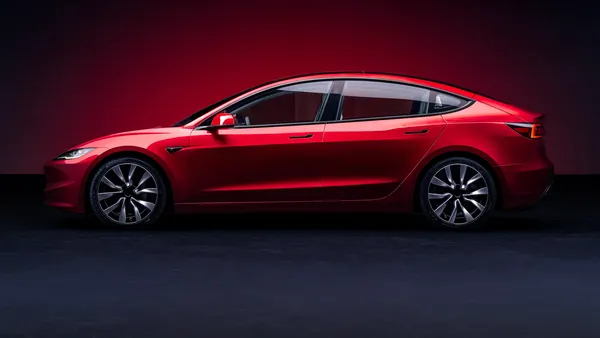Editor's note: This story is part of the WardsAuto digital archive, which may include content that was first published in print, or in different web layouts.
The best way to tell if anybody is truly happy with their job is to ask if they want their children to follow them in their chosen career.
By that measure, 40% of respondents say they would not encourage their children to pursue a career in automotive engineering.
That's up a bit from last year, and it suggests that the mood of automotive engineers at both OEMs and suppliers is slowly worsening.
Perhaps more important to the industry is a potentially debilitating proportion for suppliers it's half of automotive engineers telling us that they have recently considered jobs in other industries.
Automotive engineers are so disheartened that a substantial chunk of them say they wouldn't even be automotive engineers if they had it to do all over again.
Arguably, there is genuine malaise creeping through the ranks of automotive engineers about the state of their industry.
For instance, the majority of our respondents report severe engineering shortages at their companies, which suggest that they're being overworked.
Meanwhile, they feel that the engineers who are being hired out of college are not well prepared for their jobs as automotive engineers.
In other words, our respondents say they are not getting any help from the very people who are being hired to help them. What's more, they're watching youngsters being hired out of college who are making a lot more money than they did at that stage of their careers, and who know a lot less.
When we asked the same question last year, our OEM and supplier respondents offered more positive responses.
And as manufacturers continue to coerce suppliers into shouldering more of the engineering responsibilities for the parts they develop, our survey found that the demand for engineers at suppliers has skyrocketed.
The current economic climate suggests a surreal environment for automotive engineers. While there are very real shortages, the ranks of automotive engineers could be pruned as manufacturers are forced to cut people and product-development programs to maintain their margins.
What it all means is that the mood and the morale of automotive engineers will probably get worse before it gets better.
And here's a finding in the survey that was just plain baffling: A tad more than 6% of respondents this year say they don't know whether their salaries had increased sufficiently during the last three years.
Now, how can 35 people not be sure about whether their salaries increased sufficiently? Seems absurd doesn't it?
But perhaps this handful of folks, once they thought about it, understood that it was impossible for them to know if their salaries had increased sufficiently unless they knew the salary increases of the majority of engineers in their job classification with the same amount of seniority.
So, arguably, not sure was the most intelligent answer.
How the survey was done
Following the trend we started with last year's Engineering Survey, Ward's outsourced this year's survey to the Planning and Research department of Intertec Publishing, our parent company.
On Nov. 3, Intertec Research mailed out 2,400 surveys to WAW subscribers who work as engineers in the auto industry. Half went to OEM employees, and half to supplier employees.
By Jan. 4, we had 557 usable surveys, including 305 from OEM engineers and 252 from supplier engineers. Our response rate was a respectable 24%.
In making the survey statistically representative, we built our sample to reflect the industry at large. The OEM sample was built to mirror production market shares.
For example, General Motors Corp. produced 31.6% of North America's new vehicles in 2000, so GM engineers make up 31.6% of the OEM sample. The rest of the industry follows suit: Ford Motor Co. with 26.2%, DaimlerChrysler Corp. with 17.7%, Honda Motor Co. Ltd. with 5.8%, Toyota Motor Corp. with 4.5%, Nissan Motor Co. Ltd. with 3.7% and other producers (Volkswagen AG, BMW AG, etc.) with 10.5%.
Likewise, the supplier sample was built to reflect a wide range of small and large partsmakers. We took steps to make sure that no supplier, including Delphi Automotive Systems and Visteon Corp., was over-represented.
Watch for survey results on our Website at www.wardsauto.com .
OEM engineer comments
Any General Motors program.
As likely, supplier delivered his system, but vehicle function was sub-par because system targets were not compatible with vehicle targets.
On the K.J. program at DaimlerChrysler, TRW, who has responsibility for the front suspension module, has really choked.
Quality problems (meeting spec.) delayed a program launch six weeks.
Saab delayed the launch of new product as a result of supplier delays/incorrect spec. parts/system components.
Saturn's convertible. It was so screwed up that GM cancelled the program because of the high cost to fix it.
OEM engineer comments
25% is too aggressive without reduction in overall body mass. Mass = safety.
25% of small MPG is still a small MPG.
I don't think it's an option.
Sure, by using underpowered engines.
The technology already exists. It's known as a manual transmission.
Trucks of today's proportions will never be efficient.
Supplier engineer comments
Certain doors are very slowly opening, for instance, in Japan.
DC is sourcing to German companies.
Determining which of two merged companies makes engineering/purchasing decisions is problematic.
Have seen some evidence of Renault pushing Nissan to use Renault's suppliers.
The reverse is true. It has made it easier for overseas markets to come into the USA.
Supplier engineer comments
Big oil companies won't let it happen.
Go diesel!
Hybrid engines, fuel cell and internal combustion.
Hybrid technology is making 25% a very realistic goal.
There is absolutely no reason that the improvement could not be higher than 25%.









